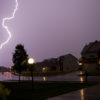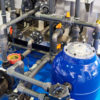When most people think about pH, they’re thinking about testing the water in their pool or aquarium. If the water’s too acidic or too alkaline, chemicals are added to adjust the pH and overall water chemistry. Here at Pool Troopers, we offer services in which we will maintain the water chemistry of your pool. So, why does the pH matter, anyway?
What is pH?
Technically, pH measures the activity of free hydrogen and hydroxyl ions within a solution, a complicated process. Fortunately, test kits make it easy to check pH. Of course, Pool Troopers can take care of maintaining your water chemistry for you.
Out in the world, pH is important to all living organisms, animals, plants, and humans, who have a natural pH. If something causes their pH to become too acid or alkaline, they are unable to thrive. This is true for creatures as small as bacteria and as large as elephants.
Another time when pH is important in the environment is acid rain. One type of tree or fish will be able to tolerate greater acidity while others struggle when there is only a small change in their environmental pH. The number of fish in streams and rivers declines because most fish eggs won’t hatch if the water has a too-acid pH of 5.0 or below.
Additionally, farmers and gardeners adjust the pH of their soil to accommodate plants that require a specific pH range. Alternatively, they may choose to plant something that isn’t as picky about soil pH and will grow nicely in their soil as it is. This is just one small way pH affects the world around us.
A Few Quick Facts About pH
As you can see, pH is extremely important to life and health.
- The pH scale ranges from 0 to 14.
- pH 0 to 6.9 is acid. Battery acid is pH 0, orange juice is pH 3, black coffee is pH 5 and milk has a pH of 6.
- pH 7.0 is neutral or basic. Pure water has a pH of 7.
- pH 7.1 to 14 is alkaline. Sea water is pH 8, baking soda is pH 9, soapy water is pH 12, bleach and oven cleaner have a pH of 13 while liquid drain cleaner is pH 14.
- Human blood pH is 7.4, but not all parts of the body have the same pH. Gastric juices are extremely acidic with a pH of 1 to 2.
As you may have noticed, extremes of either acid (battery acid: pH 0) or alkalinity (drain cleaner: pH 14) are definitely not something you want on your skin. If you’ve been drinking black coffee (pH 5) all day and your stomach is revolting, it’s acid overload. Drinking a little baking soda (pH 9) in water helps because you’re restoring the acid/alkaline balance.
The Perfect pH – 7.5
So how does this apply to your pool? A swimming pool pH should be slightly alkaline, between 7.2 to 8.0. Many feel that 7.5 is the perfect pH. When a pool’s pH is too acidic, your eyes sting and your skin feels dry, especially if you swim in your pool a lot – as many pool owners do.
The pH of your eye and mucous membranes is 7.4 to 7.6. This is the pH of tears. The closer your pool is to this magic number, 7.5, the more you’ll enjoy your swim. As it happens, pH 7.4 to 7.6 is also very good for chlorine disinfection. pH above 8.0 can cause skin irritation and at higher pH’s scaling can occur upon your pool’s surface.
If Your pH is Too Low:
A pH below 7.0 is considered to be too low. It’s hard to miss it when your pH drops too low and becomes acidic.
Lower pool pH causes:
- Irritated eyes and mucous membranes – the farther from the 7.4 to 7.6 range your pool’s pH is, the more noticeable the irritation will be.
- It is always best to swim with goggles or a mask as pool water even at proper pH is not the same as your tears.
- Corrosive damage to various components of your pool can begin at excessively low pH.
Sodium bi-carbonate is often used to raise pH.
If Your pH is Too High:
A pH above 8.0 is considered to be too high.
If your pH is too high, it causes:
- Irritated skin when the pH is excessively alkaline or above pH 8.0
- Less effective chlorine disinfection
- Cloudy water – the last thing you want to see
- Mineral precipitation, typically calcium and magnesium that often make the water look murky and cloudy
- Calcium scaling on the tile walls of your pool.
Pool Acid is often used to lower pH.
pH in Your Salt Water Swimming Pool
Sea water is slightly more alkaline (pH 8) than pure water (pH 7). A saltwater pool has a lower pH than the ocean, but a slightly naturally higher pH than a traditional swimming pool. A salt water system normally requires far less work to keep the pH where you want it.
Many Pool Troopers customers enjoy using a salt water generator. They love how low maintenance it is but are particularly enthusiastic about how wonderful their skin feels. One important reason for this great benefit of salt water pools is that the pH of a salt pool is naturally close to or the same as your body’s pH – 7.4 to 7.6.
The Importance of Chlorine
Good water quality means maintaining optimum pH and chlorine values. In other words, you check your pool water and then adjust the water chemistry with various chemicals.
Chlorine is very important as a sanitizer and oxidizer. Pool owners love chlorine because it kills dangerous bacteria and microorganisms that could harm their family.
Some people have very sensitive skin that becomes very irritated by chlorine and chlorinating compounds and chlorinated byproducts like Chloramines. Pool owners particularly hate lugging heavy bleach containers home and lugging the bleach container to and from the pool shed. They worrying about adding too much chlorinating compound or not enough. Bathing suits look faded much too soon.
After all, Pool Troopers has been in business since 1952 primarily because people want to enjoy their beautiful swimming pools without having to hassle with the pool’s water chemistry.
If you want to enjoy your pool “without the hassle,” call Pool Troopers today at 1-866-766-5877 or leave a message online. Check out our services!




